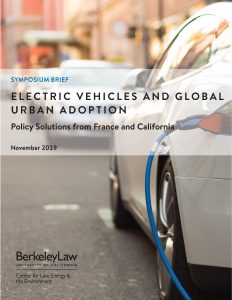Electric Vehicle Law & Policy Solutions For France & California
New CLEE symposium brief released today based on June 2019 conference
UC Berkeley Law’s Center for Law, Energy and the Environment (CLEE) is today releasing a new report on lessons learned to advance electric vehicle (EV) deployment in France and California. Electric Vehicles and Global Urban Adoption: Policy Solutions from France and California is based on a June 2019 international conference at UC Berkeley, co-sponsored by CentraleSupélec and Florence School of Regulation (FSR) in France, featuring speakers from California and French utilities, energy regulators and industry.
Electric vehicles are important to both California and France because transportation accounts for approximately 20 percent of emissions in Europe, 30 percent in the United States, and 40 percent in California (and even more when factoring in emissions from oil refineries). Yet electric vehicles still represent a small share of the overall vehicle market worldwide, at under 10 percent of new car sales in California and under 2 percent in France, despite aggressive policy targets.
Deployment in California and France is more perhaps more complicated than other jurisdictions, given that approximately 40 percent of residents in both places live in multi-unit dwellings, such as apartments, townhouses, and condominiums. Many of these dwellings are in urban areas with little or no access to charging, given the lack of dedicated parking spots and lower vehicle ownership rates. In response, the law in France requires builders of new apartment buildings to install chargers, but residents of existing buildings don’t receive those benefits.
As leaders in California and France seek to boost EV adoption, speakers at the conference identified the following challenges, also summarized in the report:
- Lack of access to affordable, convenient private electric vehicles;
- Complexity and cost of installing charging in urban settings and existing multifamily buildings;
- Declining federal incentives and insufficient vehicle demand;
- Electricity rate design decreases the financial viability of charging stations;
- Difficulty of adopting optimal charging practices that could benefit users and electric utilities;
- Difficulty of adopting optimal charging practices that could benefit users and electric utilities; and
- Need for grid infrastructure upgrades to avoid high costs on first-movers.
The conference speakers also discussed priority solutions, as the report details, including:
- National and state governments could require owners of existing multifamily buildings to install charging stations;
- National and state governments could assist transportation network companies (TNCs) like Uber and Lyft in encouraging electric vehicle adoption among their drivers, through support for the deployment of fast-charging hubs, driver education programs, and new pilot projects; and
- Electric utilities and regulators could develop new rate designs to incentivize charging while optimizing grid efficiency.
These and other solutions are discussed in the report, which will hopefully help stakeholders in both jurisdictions achieve an electric future for transportation. Bonne route!






Reader Comments